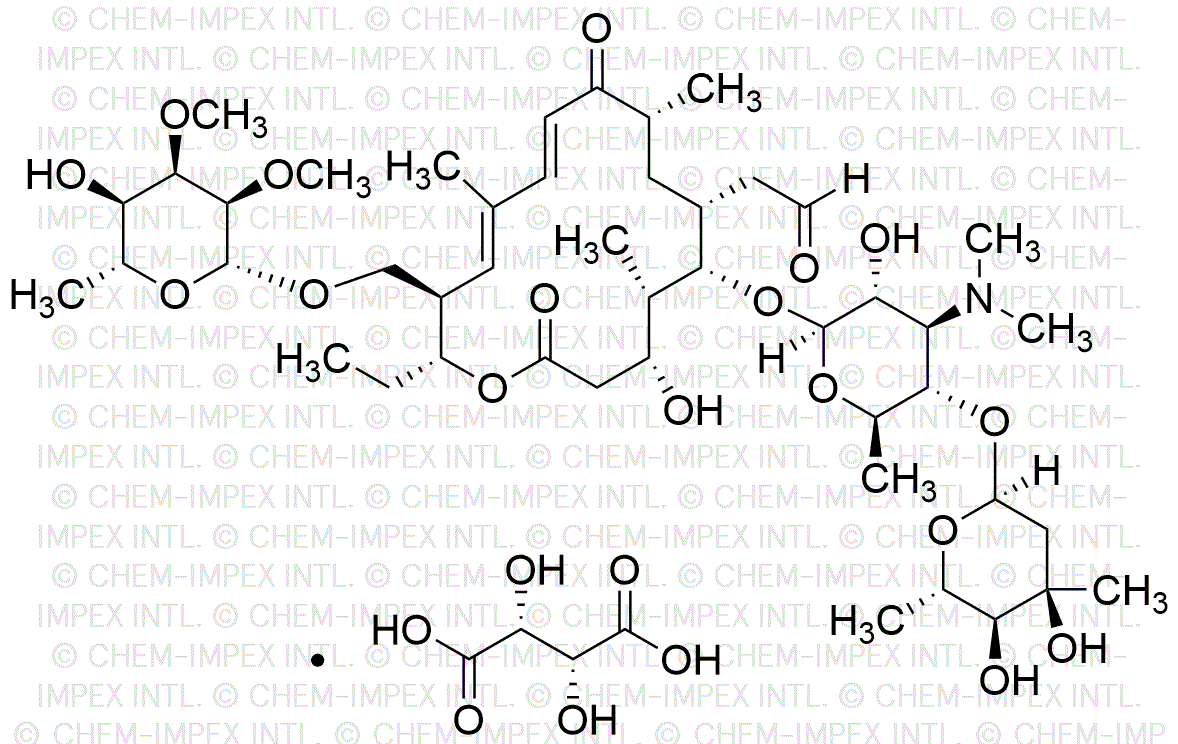Tylosin tartrate is widely utilized in research focused on
- Veterinary Medicine: Commonly used as an antibiotic in livestock to treat and prevent bacterial infections, enhancing animal health and productivity.
- Pharmaceutical Development: Serves as a model compound in drug formulation studies, helping researchers understand the pharmacokinetics and efficacy of similar antibiotics.
- Food Safety: Employed in studies assessing antibiotic residues in animal products, ensuring compliance with food safety regulations and consumer health standards.
- Biotechnology: Utilized in the production of recombinant proteins, where its antibiotic properties help maintain a sterile environment during cell culture processes.
- Research on Antimicrobial Resistance: Acts as a key compound in studies aimed at understanding and combating antibiotic resistance, providing insights into the effectiveness of existing antibiotics.
Información general
Propiedades
Seguridad y normativas
Aplicaciones
Tylosin tartrate is widely utilized in research focused on
- Veterinary Medicine: Commonly used as an antibiotic in livestock to treat and prevent bacterial infections, enhancing animal health and productivity.
- Pharmaceutical Development: Serves as a model compound in drug formulation studies, helping researchers understand the pharmacokinetics and efficacy of similar antibiotics.
- Food Safety: Employed in studies assessing antibiotic residues in animal products, ensuring compliance with food safety regulations and consumer health standards.
- Biotechnology: Utilized in the production of recombinant proteins, where its antibiotic properties help maintain a sterile environment during cell culture processes.
- Research on Antimicrobial Resistance: Acts as a key compound in studies aimed at understanding and combating antibiotic resistance, providing insights into the effectiveness of existing antibiotics.
Documentos
Hojas de datos de seguridad (HDS)
La SDS proporciona información de seguridad completa sobre la manipulación, el almacenamiento y la eliminación del producto.
Especificación del producto (PS)
La PS proporciona un desglose completo de las propiedades del producto, incluida la composición química, el estado físico, la pureza y los requisitos de almacenamiento. También detalla los rangos de calidad aceptables y las aplicaciones previstas del producto.
Certificados de análisis (COA)
Busque certificados de análisis (COA) ingresando el número de lote del producto. Los números de lote y de partida se pueden encontrar en la etiqueta de un producto después de las palabras "Lote" o "Lote".
Número de catálogo
Número de lote/lote
Certificados de origen (COO)
Este certificado de origen confirma el país en el que se fabricó el producto y también detalla los materiales y componentes utilizados en él y si se deriva de fuentes naturales, sintéticas u otras fuentes específicas. Este certificado puede ser necesario para cumplir con las normativas aduaneras, comerciales y regulatorias.
Número de catálogo
Número de lote/lote
Hojas de datos de seguridad (HDS)
La SDS proporciona información de seguridad completa sobre la manipulación, el almacenamiento y la eliminación del producto.
DownloadEspecificación del producto (PS)
La PS proporciona un desglose completo de las propiedades del producto, incluida la composición química, el estado físico, la pureza y los requisitos de almacenamiento. También detalla los rangos de calidad aceptables y las aplicaciones previstas del producto.
DownloadCertificados de análisis (COA)
Busque certificados de análisis (COA) ingresando el número de lote del producto. Los números de lote y de partida se pueden encontrar en la etiqueta de un producto después de las palabras "Lote" o "Lote".
Número de catálogo
Número de lote/lote
Certificados de origen (COO)
Este certificado de origen confirma el país en el que se fabricó el producto y también detalla los materiales y componentes utilizados en él y si se deriva de fuentes naturales, sintéticas u otras fuentes específicas. Este certificado puede ser necesario para cumplir con las normativas aduaneras, comerciales y regulatorias.


